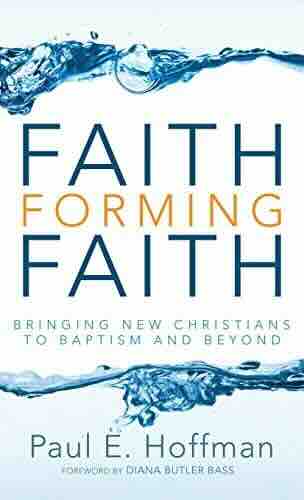Faith Forming Faith
21 Oct 2025

Faith Forming Faith: Bringing New Christians to Baptism and Beyond
Paul Hoffman
Cascade Books, 2012
I read this book because the author was the pastor at the church I grew up going to. I’ve long since left the church and its denomination, but I’ve been curious to see in black and white the thinking and theory behind the church.
My experience wasn’t horrible — there was no abuse or scandal, or anything like that — but it wasn’t great. Granted, my family was dysfunctional, and as a teenager I had my own issues… but the church wasn’t much help. All the rituals and teaching never seemed that relevant to the struggles I was going through, and when I started asking tough questions, I didn’t get satisfactory answers. Unsurprisingly, Faith Forming Faith reflects the theological emptiness of the church.
The book describes a faith-formation program called The WAY. It’s basically an adult-education class designed to prepare candidates for baptism, affirmation, and/or membership, and to keep adherents grounded in the church. In explaining the program and the thinking behind it, Hoffman talks a lot about ritual and “faith,” but rarely delves into theology. In fact, Hoffman seems to look on theology as something of an enemy. Although participants in The WAY are encouraged to ask questions, there is no set curriculum or guiding principle to help address them. Hoffman discourages “pat” theological answers — the only kind of answers theology is apparently able to give. Hoffman’s own theology is therefore fittingly vague, especially when it comes to the central rite, baptism. At times, Hoffman treats baptism as an end in itself, and the ultimate goal of his ministry. At other times, he suggests that baptism is part of a greater whole, but then the thought gets mired in sentiment and metaphor. Granted the book is short (<100pgs), and its purpose is not primarily theological. But it seems odd that a book explicitly about Christian formation and preparation for baptism should lack a straightforward explanation of what baptism is and how it works. At one point Hoffman calls his project “postmodern” — though I doubt Hoffman understands the full ramifications of the term, this further suggests an antipathy towards concrete theology.
While I appreciate the graciousness and non-judgmentalism of Hoffman’s approach, I think it’s also dangerous. Without some notion of a concrete truth to be arrived at, there’s no incentive, much less any criteria by which, faithful seekers can weigh ideas and form conclusions. And without forming conclusions, seekers don’t have a coherent idea of what their religious practices refer to, draining their sacred rituals of meaning. Baptism reduces to a mere rite of initiation into a way of life. (What that way of life is, exactly, isn’t entirely clear.) The Holy Spirit is a force or symbol which empowers one’s efforts at social justice and ethical living. (How to determine what is just and ethical never gets pinned down either.) The church does not worship “the God who is there,” as Schaeffer puts it. Rather, to my thinking, it uses the appearance of worship to minimize or obscure the unsavory aspects of the relativism it’s embraced.
In my early 20s, I myself sponsored a baptismal candidate in The WAY. I honestly don’t remember much of what I did as a mentor, other than fielding questions I didn’t have any answers for. My attendance was already spotty, and at some point afterward, I drifted away entirely. My mentee became the CEO of a successful business, also leaving the church at some point. Later, he divorced from his wife amid accusations of abuse, and later became embroiled in a series of fairly publicized sexual assault scandals (none of which were proved in court, to be fair). Likewise, my father, who was the driving force behind our family, and who also participated in The WAY, eventually left the faith — and his marriage, too, ended in divorce.
This is all anecdotal, of course, but I offer it as a counterpoint to the uniformly positive anecdotes in the book. Because of my experience, it’s difficult for me to see how positive outcomes could be anything more than coincidental. It’s also difficult to see how someone like Hoffman, who has made a living supposedly studying and preaching the Bible, could have such shallow understanding of the book, and the rituals it instituted. It’s deeply ironic that Hoffman repeatedly asks, and even titles one of his chapters, “What does this mean?” since he himself seems reluctant — or unable — to answer.
This review was originally published in a slightly different form on Goodreads in 2024.